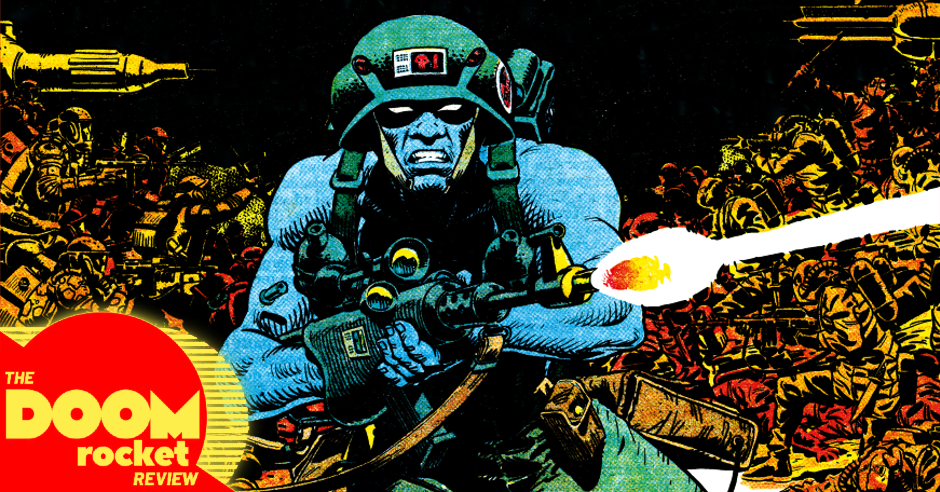by Mickey Rivera. In 1977, writer Shawn Taylor (writer for Nerds of Color) had a formative experience that forever turned him over to the dark side. “Star Wars had come out that summer,” he writes, “and all the kids who saw it wanted to reenact every scene of the movie.” Taylor adored science fiction and fantasy, and had been reading everything he could find relating to it since he had been three. While kids were doling out roles to act out scenes from Episode IV, he was given only two choices: Chewbacca or Dark Vader. “Dark Vader, mind you,” Taylor writes. “Not Darth.” Given the choice between “a big, furry, non-intelligible dog man, or the biggest, baddest, blackest source of evil in the entire galaxy,” Taylor chose the one with power and a voice.
This anecdote is detailed in an essay by Taylor featured in Black Comix Return, and it perfectly illustrates two issues with nerd culture relative to the black experience. First, a dearth of black characters in speculative fiction has left countless fans feeling as though they have no place in the fandom. Second, black fans want a voice. In search of a remedy, visual artist and professor John Jennings (who is black) teamed up with cartoonist and scholar Damian Duffy (who is white and self-described himself as “Just Enough to Discourage the Coroner Beige,”) to come out with Black Comix: African American Independent Comics, Art and Culture.
Released in 2010, this sweeping index of contemporary, active, black artists in and around the comic book industry cast spotlights on just under one hundred black artists. Black Comix Returns pays a much-needed return to the topic, providing art samples and information concerning an equally impressive assortment of new and returning black artists.
The first Black Comix collection has been out of print for a while now, and if you want a copy it’ll cost you more than twice the original retail price, at least. The reason it’s fetching premium prices is due in part to its rarity, but also its utility as a resource for lesser known or underutilized talents. Black Comix Returns, like its predecessor, is not about proving that black artists exists. Everyone knows they do. What’s less clear is who they are, what they do, and how they fit into the larger picture. This book provides that context, not only naming names but giving each artist room to talk about their major projects and background.
The art in this collection comes in every style you can imagine, from the classic cartooning of Joel Christian Gill to the psychedelic frenzy of Ignatz winner Ben Passmore. As a testament to their desire to open the playing field, Jennings and Duffy included graphic designers (Stacy Robinson) and screenwriters (Tony Puryear) alongside established professionals (Ronald Wimberly and Kwanza Osajyefo to name just a couple). Black Comix Returns is a barrage of black talent. Besides the art, interspersed throughout, are “contextualizing essays,” like the one by Shawn Taylor. These essays highlight topics relating to comics, community, and black identity. Submitted by artists, writers, and even community organizers, they pick up where the art leaves off, providing a chance to step back and look at the broader picture.
Taking a wide-angle shot of the black comics scene is exactly what the editors are aiming for here. Jennings and Duffy both have backgrounds that straddle the loosely entwined worlds of art, comics, and academia. Back in 2008, they curated a response to the “Masters of American Comics” exhibition for Museum of Contemporary Art in Los Angeles with one of their own, called ‘Out of Sequence: Underrepresented Voices in American Comics’ at University of Illinois at Urbana–Champaign’s Krannert Art Museum in 2008. Diving into the depths of comic history for material, they discovered artists in both the mainstream and underground from typically under-represented groups: women, people of color, comics by gay and lesbian artists.
Both Jennings and Duffy have a deep love for black culture that’s equally matched by their penchant for cultural analysis. Jennings, currently a professor of Media and Cultural Studies at UC Riverside, co-edited The Blacker the Ink, a collection of essays that meticulously analyze comics and their relationship to black identity. Duffy wrote an adaptation of Octavia Butler’s Kindred which Jennings illustrated. This pair is not just into making and reading comics — they want context, and they want to provide tools for making comics the diverse medium it needs to be.
Black Comix Returns continues the work of the original, taking in as much of the black comics scene as possible in the space of about 200 pages. This book is an essential tool for the culturally hungry. It’s a giant map with over a hundred X’s marking possible treasure — or “entry points to an exploding cultural scene,” as the editors put it. In the right hands, it’s worth far more than the sum of its parts.
Lion Forge/The Magnetic Collection/$29.99
Edited by John Jennings and Damian Duffy.
Featuring work by Leisl Adams, Paris Alleyne, Shawn Alleyne, Greg Anderson-Elysee, Jiba Molei Anderson, Dawud Anyabwile, Kyle Baker, Andre Batts and Urban Style Comics.
Darryl Ayo Braithwaite, David Brame, Akinseye Brown, Stanford Carpenter, Enrique Carrion, Matthew Clarke, Jerry Craft, Keef Cross, Phonzie Davis.
Sharon DeLaCruz, Te’Shawn Dwyer, Brandon Easton, Barrington Edwards, Tim Fielder, Shawnee and Shawnelle Gibbs, Naseed Gifted, Joel Christian Gill, Shauna J. Grant.
Sanford Greene, Michael Lee Harris, N. Steven Harris, Micheline Hess, Jamal Igle, Joe Illidge, Robert Jeffrey II, Avy Jetter, Keithan Jones, D.J. Kirkland, Keith Knight.
Jamar Logan, Jeremy Love, Robert Love, Julian Lytle, Sean Mack, The Madtwiinz (Mark and Mike Davis), Takeia Marie, Shawn Martinbrough, Shawna Mills, Arie Munroe.
Bryan Cristopher Moss, Fred Nolan, Turtel Onli, Kwanza Osajyefo, Ben Passmore, Rooseveldt Pitt Jr., Anthonly Pugh, Khary Randolph, Abdul H. Rashid, Sole Rebel, Jason Reeves.
Afua Richardson, La Morris Richmond, Robert Roach, Stacey Robinson, Regine Sawyer, Malik Shabazz, Alex Simmons, Juliana “Jewels” Smith, Tim Smith 3, James Stanley.
Brian Stelfreeze, C. Steenz Stewart, Larry Stroman, Whit Taylor, Tephlon Funk (Stéphane Métayer, David Tako, Nicolas Safe), Brandon Thomas, Lance Tooks, Tanna Tucker.
Uraeus (Richard G Tyler II), Carl Varnardo, Chris Visions, Jerome Walford, David Walker, Joseph Wheeler III, Ronald Wimberly, Ashley A. Woods.
9 out of 10














